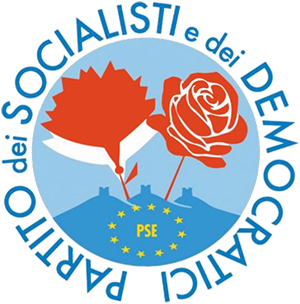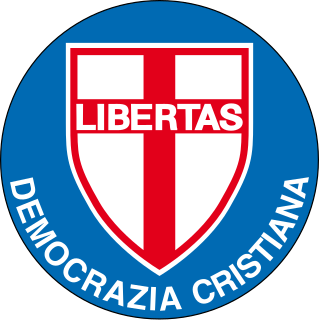
Arnaldo Forlani, is an Italian politician who served as the 43rd Prime Minister of Italy from 18 October 1980 to 28 June 1981. He also held the office of Deputy Prime Minister, Minister of Foreign Affairs and Minister of Defence.

The Italian Democratic Socialists were a social-democratic political party in Italy. The party was the direct continuation of the Italian Socialists, the legal successor of the historical Italian Socialist Party. Also the Italian Democratic Socialist Party, the other long-time Italian social-democratic party, was merged into it.

The political groups of the European Parliament are the parliamentary groups of the European Parliament. The European Parliament is unique among supranational assemblies in that its members (MEPs) organise themselves into ideological groups as in traditional national legislatures. The members of other supranational assemblies form national groups. The political groups of the European Parliament are sometimes the formal representation of a European political party in the Parliament. In other cases, they are political coalitions of a number of European parties, national parties, and independent politicians.
The Historic Compromise, called also Third Phase or Democratic Alternative, was an Italian historical political alliance and accommodation between the Christian Democrats (DC) and the Italian Communist Party (PCI) in the 1970s.

The Party of Socialists and Democrats is a social-democratic and democratic socialist political party in San Marino. It is a member of the Socialist International and its current-day Italian counterpart is the Democratic Party.

General elections were held in Italy on 3 June 1979, to select the Eighth Republican Parliament. This election was called just a week before the European vote: the failure to hold the two elections at the same time caused much criticism for wasting public money.

The Italian Democratic Socialist Party was a minor social-democratic political party in Italy. The PSDI, before the 1990s decline in votes and members, had been an important force in Italian politics, being the longest serving partner in government for Christian Democracy. The party's founder and longstanding leader was Giuseppe Saragat, who served as President of the Italian Republic from 1964 to 1971.
The Popular Democrats was a Christian-leftist Italian political party active in the Aosta Valley of Italy. Its leading members included Cesare Dujany, Maurizio Martin and Angelo Pollicini.

The Piedmontese regional election of 1970 took place on 7 June 1970.

The Lazio regional election of 1970 took place on 7 June 1970.

The Sardinian regional election of 1979 took place on 17 June 1979.

The Friuli-Venezia Giulia regional election of 1964 took place on 10 May 1964.

The Friuli-Venezia Giulia regional election of 1968 took place on 26 May 1968.

The Friuli-Venezia Giulia regional election of 1978 took place on 25 June 1978.

The Friuli-Venezia Giulia regional election of 1983 took place on 26 June 1983.

The Friuli-Venezia Giulia regional election of 1988 took place on 26–27 June 1988.
The Pentapartito, commonly shortened to CAF refers to the coalition government of five Italian political parties that formed between June 1981 and April 1991. The coalition comprised the Christian Democracy (DC) party and four secular parties: the Italian Socialist Party (PSI), Italian Democratic Socialist Party (PSDI), Italian Liberal Party (PLI) and Italian Republican Party (PRI).
The centre-left coalition is a political alliance of political parties in Italy active, under several forms and names, since 1995 when The Olive Tree was formed under the leadership of Romano Prodi. The centre-left coalition ruled the country for more than twelve years between 1996 and 2018.

The 1993 Italian local elections were held on 6 and 20 June, on 21 November and 5 December. It was the first time where citizens could vote both for the mayor and the city council.













